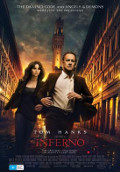
Directed by
Ron Howard
121 minutes
Rated M
Reviewed by
Chris Thompson

Inferno
Synopsis: After waking up in a hospital room in Florence, Italy, with a bullet wound to the head and no memory of what has occurred for the past 48 hours, Robert Langdon (Tom Hanks) suddenly finds himself being chased by Christoph Bruder (Omar Sy) and Dr Elizabeth Sinskey (Sidse Babett Knudsen) from the World Health Organisation as well as agents of a nefarious private security firm headed up by Harry Sims (Irrfan Khan). With the help of Dr. Sienna Brooks (Felicity Jones) and his knowledge of symbology, Langdon tries to evade capture whilst solving a puzzle that will save the world from the Inferno virus; a deadly plague created by billionaire Bertrand Zobrist (Ben Forster) who plans to save the planet by wiping out humanity.
Even if you employ the high level of suspension of disbelief required for the plots of these kinds of films to work, it’s still a big ask for an audience to go along with the multitude of manufactured twists and turns served up by Ron Howard in this, his third crack at bringing those big, fat, author-name in-bigger-print-that-the-title best-sellers to the screen. Dan Brown’s fame (and considerable fortune) was built on his third novel, "The Da Vinci Code", which set the world’s imagination alight. Since then, he has written two further novels, The Lost Symbol (the film adaptation for which seems to have been momentarily abandoned) and this, his most recent book adapted here by veteran blockbuster screenwriter David Koepp.
I’ve read a few Dan Brown’s (yes, it’s true, my low brow deserves attention too from time to time) but not this one so I can’t say whether responsibility for the plot holes, contrivances and implausibilities in this film lie with the author or the screenwriter but wherever they originate (and it’s a fair bet that they originate in the novel) they are numerous and, at times, laughable. One wonders, for instance, why a mad billionaire hell-bent on freeing the world of its population would go to all the trouble of laying out a complex set of cryptic clues that, if solved, would enable the good guys to foil his plan. Equally, one is hard pressed to explain how, when one of the bad guys drags Langdon into a random hiding place for reasons that won’t be good for our hero’s health, one of the good guys turns up in the nick of time without any attempt to explain how he could possibly have known they were there. And then there’s the dialogue. When you rely on lines like “Somehow she found out…” you might as well just say that you’re giving up on underpinning any of the key bits of plot with logic or story credibility in favour of magic-bullet solutions. But dialogue is never a strong suit in films like this. There is so much information, history and clue-explanation to get across to the audience that it just becomes a string of exposition punctuated occasionally by corny, flimsy shreds of characterisation. And when the big twist comes, it’s certainly a good surprise, but it doesn’t bear too much close attention lest the first two thirds of the film completely unravels.
Like Denzel Washington, Tom Hanks is a generally reliable, eminently watchable movie star who has the capacity to lift a film even if it isn’t very good. But like Washington in the just-released The Magnificent 7, Hanks seems adrift in this film that needs him to run awkwardly from one historical site to the next so that he can espouse some obscure bit of history and bend that into a clue that motivates him to run off awkwardly again, usually dodging bad-guy bullets, unsure of whether he’s trying to be Jason Bourne or Indiana Jones He ends up as neither and the film, despite its high production values and cast of good actors, ends up sharing that middling nothingness with him.
At least The Da Vinci Code and Angels and Demons had a grounding in the mysteries of religion and ancient, cultish rituals. Here, the story tries to find that same historical touchstone by enlisting Dante’s Inferno as the repository of puzzle and prophecy but without some deep, historical conspiracy to justify it, it all just winds up feeling like it’s the best they could come up with. And, in this case, the best is not very good.

Want more about this film?


Want something different?




